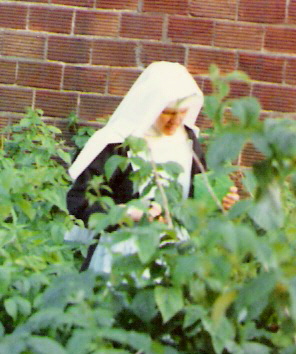
Composting makes good soil which bears good fruit. The benefits of composting, saving kitchen scraps to enrich garden soil, has been proven, but can we say the same for spiritual composting? For Leonie Martin, the practice was a necessity because, in her life and within herself, there were heaps of spiritual garbage.
Leonie’s first step in becoming “good soil” for her spiritual garden was admitting her weaknesses, apologizing for her faults, and placing her hurts into a little bucket of humility to bury them in the heart of Jesus. The “mysterious soil” of the forgiving and compassionate heart of her Savior meant confidence in his unconditional love and trust in his mercy. She writes: “I don’t cover up the difficulties, knowing from experience how weak, cowardly and inconsistent I am.” (1919) Faced with her shortcomings, she turns to God’s unfailing love. She does not give up and tries to improve: “I must turn away from my inclinations which lead me to flee from sacrifice and suffering.” (1918) “I have the presentiment that all of these agonies are a purification, and that God, happily, is doing his work.” (1917) This “spiritual composting” was well underway for her when God gave her the unheard of opportunity (she was a cloistered nun) to converse intimately with her Carmelite sisters about their youngest sister Therese’s holy life, holy death, and her “Little Way“. This happened in 1915 when Leonie was called to give her testimony at the canonization process taking place in the Carmel of Lisieux where her three surviving sisters lived.
Now, Leonie, even more determined to continue her work at transformation, was going to: “to hold onto the hand of Jesus and let herself be carried by him”. This second step of Christian composting will become continuous as she surrenders her entire being to merciful love. Leonie made a definitive decision to trust Jesus always and everywhere, to depend upon his will for her life. No looking back. No holding back. It was going to be a lifelong trust walk. Walking with him through the cloisters she would say: “My Jesus and my all! Merciful Jesus, help me!” And as she walks with him, she listens to his voice and is determined to do whatever he tells her: not only does she follow his inspirations, but also the wishes of her superiors: “I count on obedience which truly works wonders in me to the point sometimes that I no longer recognize myself. Also, I love this virtue… because it leads me surely to humility which is my favorite virtue.” (1911) Leonie, the girl whose tantrums would “make scholars forget their Latin“, is now noted for her submission. She asks permission for everything. And this she does, despite her repugnance. Carried in Jesus’ arms does not exempt Leonie from doing her part: “...it seems to me that for me, this is a martyrdom of pinpricks; but in return, it amounts to so many flowers that I cast under the feet of the Infant Jesus.“
This interior transformation, like the mystery of chemical decomposition that takes place underground, remains hidden and silent. It is a time of prayer. A time of doing the most menial tasks in the monastery. A time of struggle which begins to bear fruit: “To go ceaselessly against one’s inclinations, that is the secret of happiness, a foretaste of Heaven, and it puts so much peace into my soul.” Leonie becomes holy not only by holding Jesus’ hand, but by climbing up onto the cross with him to suffer. She accepts merciful love, she abides in merciful love, and – in this third and final step of spiritual composting – she becomes a participant in merciful love. This she does by offering up her own suffering to join Christ’s and by her little works of mercy. As she often said: “Ask of me anything you wish, I am ready to come to your aid.”
Leonie begins to bear good fruit as she herself now becomes the seed that dies and resurrects to new life. Her Good Friday comes. The last ten years of her life bring more physical sufferings: in-grown toenails, knee surgery, illnesses that confine her to bed, arthritis… Yet through it all, she finds joy: “I am getting along marvelously, as my lumbago makes me bend over like a little old lady of a hundred; we go on this way joyously to Paradise..” (1936)

Paradise. She has given all to her Jesus. Followed him through all the doubts and difficulties. She has become good soil. And so, on June 17, 1941, at the age of seventy-eight, her Father in Heaven calls her back to himself. One more time Jesus holds onto her hand: “Come beloved of my Father…”
One can imagine the spiritual garden of Leonie Martin on that day. Early in the morning, with the sun glistening through the dew on the broad leaves of her squash plants – and the soft, damp earth all ’round – covered with hundreds of earthworms dancing with delight. She has arrived.
